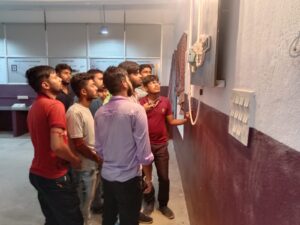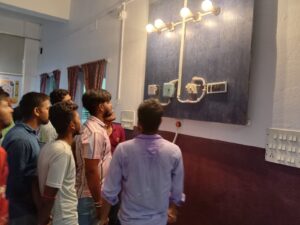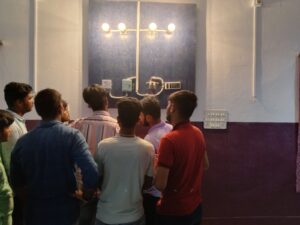
ELECTRICAL WORKSHOP: The Electrical Engineering Department at the Modern Institute of Engineering & Technology (MIET) offers a comprehensive practical training program in its Electrical Workshop. This program is designed to help students develop the skills and knowledge necessary to apply their theoretical knowledge to real-world electrical engineering problems
Practical Training: Bridging the Gap between Theory and Practice
At MIET, the Electrical Engineering Department understands the importance of bridging the gap between theoretical knowledge and practical application. This is where practical training programs come into play, allowing students to enhance their interdisciplinary knowledge and dive deep into the world of electrical engineering.

The Significance of Practical Training
- Application of Theoretical Knowledge: While theoretical knowledge forms the foundation of education, practical training programs provide students with the opportunity to apply what they have learned in real-world scenarios. This hands-on experience is invaluable in deepening their understanding of electrical engineering concepts.
- Problem-Solving Skills: Practical training encourages students to think critically and solve real-world engineering challenges. It fosters creativity and innovation by requiring students to devise solutions to complex electrical problems they may encounter in their future careers.
- Interdisciplinary Learning: The field of electrical engineering is highly interdisciplinary, and practical training programs help students connect the dots between various subjects. They gain insights into how electrical engineering integrates with other fields, such as electronics, computer science, and mechanical engineering.
MIET’s Electrical Workshop: A Hub for Practical Learning
At MIET, the Electrical Workshop is the heart of practical learning for electrical engineering students. This state-of-the-art facility is equipped with cutting-edge tools, equipment, and resources that allow students to explore electrical engineering concepts in a hands-on manner.

Key Features of MIET’s Electrical Workshop
- Advanced Equipment: MIET understands the importance of keeping up with the latest industry trends. The Electrical Workshop is equipped with modern instruments, including oscilloscopes, power supplies, circuit simulators, and various electrical machinery, to ensure students have access to the best resources.
- Skilled Instructors: The institute’s faculty members are highly experienced and dedicated to guiding students through their practical training. They provide mentorship, supervision, and support, ensuring that students develop the skills they need to excel in their field.
- Safety Protocols: Safety is a top priority at MIET. The institute has stringent safety protocols in place to ensure that students can experiment and learn in a secure environment. Students are trained in safe practices and are closely monitored during practical sessions.
- Industry Partnerships: MIET collaborates with leading electrical engineering companies and organizations, providing students with opportunities for internships and real-world projects. This not only enhances their practical skills but also helps them establish industry connections.
Benefits of Practical Training at MIET
The practical training programs offered by MIET’s Electrical Engineering Department have several notable benefits for students:

- Enhanced Employability: Graduates with practical experience are highly sought after by employers. MIET’s practical training programs prepare students to hit the ground running in their careers, making them attractive candidates for electrical engineering positions.
- Confidence Building: Practical training instills confidence in students by allowing them to apply their knowledge in real-world scenarios. This confidence is invaluable when they face challenging situations in their professional lives.
- Holistic Learning: MIET’s commitment to interdisciplinary learning ensures that students gain a well-rounded education. They not only become proficient electrical engineers but also learn how to collaborate across various fields.